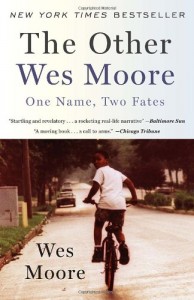 I just finished reading, “The Other Wes Moore,” by Wes Moore. It’s the Buckeye Book Community selection for this year’s incoming class. The book tells the story of two African-American boys with the same name growing up in more or less the same place at the same time.
I just finished reading, “The Other Wes Moore,” by Wes Moore. It’s the Buckeye Book Community selection for this year’s incoming class. The book tells the story of two African-American boys with the same name growing up in more or less the same place at the same time.
The twist: One ends up in jail and the other ends up enormously accomplished.
The book gives us a clear picture of Baltimore or more specifically, West Baltimore. I learned a lot from it. The thing that hit me the hardest was the level of violence that 7- to 10-year-old boys routinely face. It’s worth thinking about as we read the news every day. The statistics that Moore gives are compelling. Seeping underneath it all is the vice grip of poverty.
The reviewers heaped this book with praise and it should spark a lot of conversation this new school year, but I’ll be candid with you. I was spoiled by reading “The Short and Tragic Life of Robert Peace” a few months ago. That book is beautifully written by an accomplished writer. It is also complete and reflective.
The author of “The Other Wes Moore” tells the story of the other Wes Moore better than he tells his own. The book is patchy; a lot of pieces about the author’s life are left out.
The lucky thing is that Wes Moore, the author, will be visiting campus this fall, so we can ask him as many questions as we need to fill in the blanks. I’d like to hear more about his thinking too. For example, while he praises his mother and other women in his life, he doesn’t reflect on the quality of their lives or motives or how to make those lives any better. Didn’t both mothers try as hard and love as much? What is it about context that makes a difference?
Moore’s book gives us perspective on the urban African American boy’s chance of success in today’s culture.
Students and colleagues, as you read this book, please share your opinion of it with me.